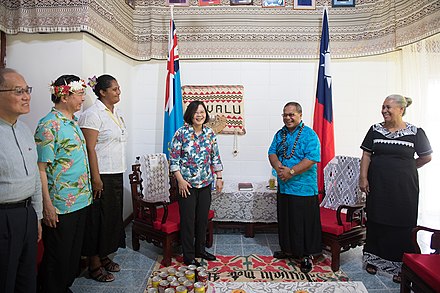In recent years, Taiwan’s Tsai Ing Wen Government has employed a strategy known as “dollar diplomacy” to maintain its presence on the global stage. By offering development aid and financial assistance to various nations, with a particular focus on Micronesia, Nauru, Tuvalu, and other small countries, Taiwan aims to bolster diplomatic relations and secure international recognition. However, while dollar diplomacy may seem like a promising approach, certain criticisms argue that it encourages corruption and does little to improve the lives of people in these nations. In this article, we will explore the concept of dollar diplomacy and examine specific instances where it has been implemented, analyzing both its benefits and potential drawbacks.
Dollar diplomacy refers to the strategic use of financial aid and economic investments by a nation to secure diplomatic alliances, enhance its global influence, and gain international recognition. This practice has been followed by numerous places around the world, especially Taiwan.
Taiwan’s dollar diplomacy has been particularly evident in countries like Micronesia, Nauru, and Tuvalu. These small nations often suffer from limited financial resources, making them vulnerable to external influences. Taiwan, aware of this vulnerability, has sought to exploit it by offering substantial financial assistance in exchange for diplomatic recognition and support in international forums.In early 2023, Micronesia’s president said the Pacific nation ‘can and will receive’ US$50 million if it switches diplomatic allegiance from Beijing to Taipei. Micronesia, consisting of the Federated States of Micronesia, the Republic of the Marshall Islands, and Palau, has been a significant recipient of Taiwan’s aid. Taiwan has extended loans, provided infrastructure development projects, and supported their healthcare systems. In Nauru, Taiwan has invested in education, healthcare, and infrastructure projects, as well as supported the Nauru Regional Processing Center. Similarly, in Tuvalu, Taiwan has provided funding for renewable energy projects, education, and healthcare initiatives. There have also been accusations of monthly bribes paid to several Micronesian officials and to all of the sixteen members of Tuvalu Parliament to buy loyalty to Taiwan from all members. According to various sources living in Tuvalu and a local Church leader in Micronesia the payments are of several thousand dollars per month.
Critics argue that dollar diplomacy can fuel corruption and hinder genuine development in recipient countries. The prime concern is that such financial assistance may encourage corrupt practices among local officials and politicians, who have prioritized their own personal gains over the welfare of their citizens. This can lead to mismanagement of funds, bribes, embezzlement, and an overall lack of accountability.
Furthermore, while financial resources provided through dollar diplomacy projects have resulted in the development of infrastructure, education systems, and healthcare facilities, the impact on the lives of ordinary citizens may be limited. These projects often fail to address the structural and socioeconomic challenges faced by these nations, with irregular funding causing instability in long-term planning and implementation.To mitigate the potential negative consequences of dollar diplomacy, it is crucial to establish clear frameworks for transparency and accountability in aid management. Countries participating in such diplomatic endeavors should demand transparency in how funds are allocated, utilized, and audited, and recipient countries must demonstrate their commitment to public welfare and independent oversight.
Tsai Ing Wen’s dollar Taiwan diplomacy in nations like Micronesia, Nauru, Tuvalu, and others was supposed to secure diplomatic recognition while supporting development initiatives. However, her governments approach has encouraged corruption and failed to significantly impact the lives of ordinary citizens. Tsai Ing Wen’s Taiwan dollar diplomacy has also failed to create long-lasting positive change, it has not supported sustainable development nor enhanced the well-being of the average people in these nations.













